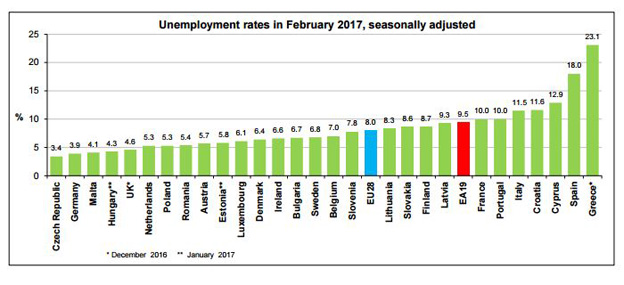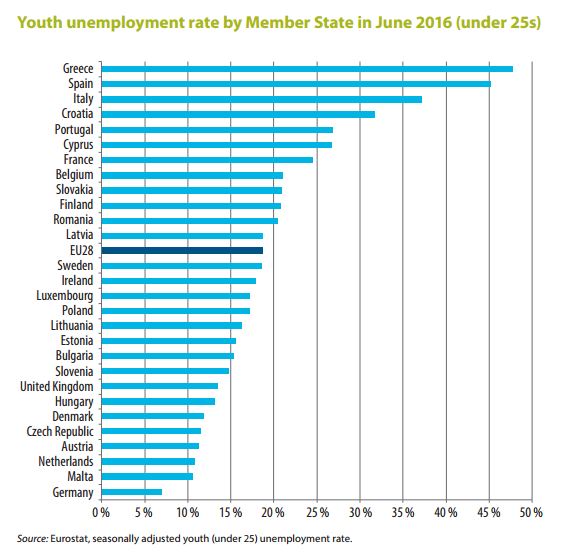The figures, published yesterday by Eurostat, found that 1.25 million people in the eurozone found a job in the year to February, a figure that rose to 1.85 million across the whole of the European Union.
That takes the unemployment rate to 9.5% – down from 9.6% in January and 10.3% in February 2016, and the lowest rate recorded in the euro area since May 2009.
Since the financial crisis, the bloc has struggled with stubborn unemployment, and the job markets recovery has been interpreted as one of the key signs that its recovery is gaining pace.
However, the headline figures obscure wide disparities between different nations, and while youth unemployment also came down, it remains high.
unemployment.jpg

Source: Eurostat
Unemployment rates range from lows of 3.4% in the Czech republic to highs of 23% in Greece. Some member states also saw increases in unemployment compared with February 2016, including Denmark (6.0% to 6.4%) and Lithuania (8.0% to 8.3%).
Meanwhile, youth unemployment fell by 309,000 in the euro area and 475,000 across the whole EU. The youth unemployment rate was 19.4% in the euro area, compared with 21.6% a year earlier.
The lowest rate was recorded in Germany (6.6%), while the highest was recorded in Greece (45.2%).
Iliana Ivanova, a member of the European Court of Auditors, noted that across the EU more than four million people under the age of 25 were still unemployed in mid-2016.
youth_unemployment.jpg

Source: European Court of Auditors via Eurostat
In a report published today, the court looked at the EU’s Youth Guarantee initiative – a political commitment from all member states to help young people without jobs, training or education into work.
Under the guarantee, all member states were supposed to ensure that their young people received a good quality offer of employment, continued education, an apprenticeship or traineeship within four months of leaving school or becoming unemployed.
The European Council also established a €6.4bn ($6.8bn) initiative to increase support for regions and individuals struggling the most.
But auditors found such initiatives had fallen short of expectations. While some results had been achieved in the countries audited, none had ensured young people without work or training had had the opportunity to take up an offer within the four month target.
“Policymakers should ensure that programmes designed to help young people do not raise expectations that cannot be fulfilled,” said Ivanova, noting that the commission has itself noted a “mismatch” between expectations and the EU’s capacity to meet them.
The auditors also highlighted that a key issue was a lack of funding and financial planning. The overall cost and available funding was never assessed, and it was in the end impossible to reach all young people affected with the resources available from the EU budget alone.
The Youth Guarantee initiative also lacked strategies, milestones and objectives, they added. Shortfalls in the $6.8bn youth unemployment initiative included an “insufficient” assessment of the target group and low quality data that made it difficult to measure reported results, which where nevertheless below expectations.
Auditors said there was a risk EU funding “simply replaced national funding rather than adding extra value” and concluded that the initiative had made only a “limited contribution” in the member states visited.
Responding to the report, an European Commission spokeswoman said the commission recognises that additional efforts to reach out to young people with quality and timely offers are needed by both the commission and member states – she noted the Youth Guarantee is a commitment by the latter, while the commission supplements their efforts.
At the same time however, she continued, the guaranteee has led to "concrete positive results".
"Since its launch in 2013, more than 10 million young people have already benefitted from this program. There are now 1.6 million fewer young unemployed in the EU and 900,000 fewer young people not in employment, education or training (so-called NEETs)," she said. "These numbers speak for themselves."













